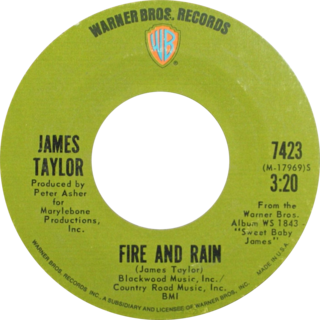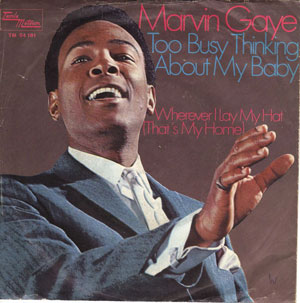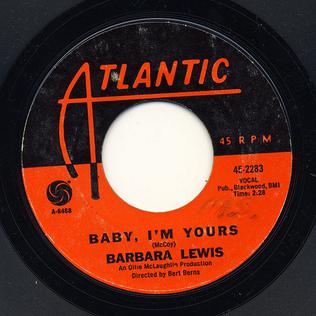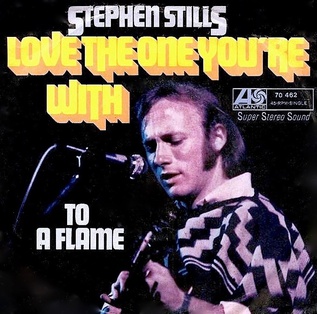
"Fire and Rain" is a song written and performed by American singer-songwriter James Taylor, released in August 1970 by Warner Bros. Records as the second single from Taylor's second studio album, Sweet Baby James. The song follows Taylor's reaction to the suicide of Suzanne Schnerr, a childhood friend, and his experiences with drug addiction and fame. After its release, "Fire and Rain" peaked at number two on RPM's Canada Top Singles chart and at number three on the Billboard Hot 100.

JT is the eighth studio album by American singer-songwriter James Taylor. It was released on June 22, 1977, via Columbia Records, making it his first album released for the label. Recording session took place from March 15 to April 24, 1977, at The Sound Factory in Los Angeles with Val Garay. Production was handled by Peter Asher.

The Best of James Taylor is the fourth compilation album by American singer-songwriter James Taylor released by Warner Bros. Records in 2003. The same album was released in Europe as You've Got a Friend: The Best of James Taylor.

"Too Busy Thinking About My Baby" is a Motown song written by Norman Whitfield, Barrett Strong, and Janie Bradford. The song was first recorded by The Temptations as a track on their 1966 album Gettin' Ready. Eddie Kendricks sings lead on the recording, which was produced by Whitfield. Jimmy Ruffin also recorded a version with The Temptations providing background vocals in 1966. It remained unreleased until 1997.

James Jones was an American singer-songwriter who moved to New York City while a teenager. According to Allmusic journalist Steve Huey, "best known for his 1960 R&B smash 'Handy Man', Jones sang in a smooth yet soulful falsetto modeled on the likes of Clyde McPhatter and Sam Cooke."
"For All We Know" is a soft rock song written for the 1970 film Lovers and Other Strangers, with music by Fred Karlin and lyrics by Robb Wilson and Arthur James. Both Royer and Griffin were founding members of the soft rock group Bread. It was originally performed, for the film's soundtrack, by Larry Meredith. The best known version of the song is by American pop duo the Carpenters which reached No. 3 on the US Billboard Hot 100 chart and No. 1 on the US Billboard Easy Listening chart in 1971. The song was also a hit for Shirley Bassey at the same time in the United Kingdom. It has since been covered by various artists including Petula Clark.

"Somebody to Love" is a song by the British rock band Queen, written by the lead singer/pianist Freddie Mercury. It debuted on the band's 1976 album A Day at the Races and also appears on their 1981 compilation album Greatest Hits.
"Time Is on My Side" is a song written by Jerry Ragovoy. First recorded by jazz trombonist Kai Winding and his orchestra in 1963, it was covered by both soul singer Irma Thomas and then later the Rolling Stones in 1964.

"Baby I'm Yours" is a song written by Van McCoy which was a hit in 1965 for Barbara Lewis, the original recording artist. The song was featured in the 1995 film The Bridges of Madison County and was included on the soundtrack album. It was also featured in the TV movies The Midnight Hour (1985) and An American Crime (2007), as well as being briefly featured in Baby Driver.
"If I Were a Carpenter" is a folk song written by Tim Hardin in the 1960s, and re-recorded with commercial success by various artists including Bobby Darin, The Four Tops and Johnny Cash. Hardin's own recording of the piece appeared on his 1967 album Tim Hardin 2. It was one of two songs from that release performed by Hardin at Woodstock in 1969. The song, believed by some to be about male romantic insecurity, is rumored to have been inspired by his love for actress Susan Morss, as well as the construction of Hardin's recording studio.

"Love the One You're With" is a song by American folk rock musician Stephen Stills. It was released as the lead single from his debut self-titled studio album in November 1970. The song, inspired by a remark Stills heard from musician Billy Preston, became his biggest hit single, peaking at No. 14 on the Billboard Hot 100 in early 1971. David Crosby and Graham Nash, Stills' fellow members of Crosby, Stills & Nash, provide background vocals on the song. Also providing the backups are Rita Coolidge, her sister Priscilla Jones, and John Sebastian. They all sing the "Do Dos" that come before the instrumental portion and the Outro. The song was also recorded by the Isley Brothers, The Meters, Bucks Fizz, Luther Vandross, Bob Seger and Richard Clapton, among others.

"Shame on the Moon" is a song written by Rodney Crowell and first recorded in 1981. It was covered by Bob Seger & the Silver Bullet Band as the lead single from their 1982 album The Distance.

"Wild Night" is a song written by Northern Irish singer-songwriter Van Morrison and is the opening track on his fifth studio album Tupelo Honey. It was released as a single in 1971 and reached number 28 on the Billboard Hot 100 chart. In 2022, the song peaked at #1 on the radio airplay chart in Canada.

"Wrap Her Up" is a song by English musician Elton John, released as the second single from his 1985 album, Ice on Fire. George Michael provides backing vocals on the song. The single had limited success worldwide.

"I'll Be Good to You" is a 1976 hit song by R&B duo the Brothers Johnson. George Johnson, one of the two Johnson brothers in the band, wrote the song after deciding to commit to a relationship with one woman, instead of dating several at a time. While George was recording a demo for the song, family friend Senora Sam came by and added some lyrics. Brothers Johnson producer and mentor Quincy Jones heard the song, liked it, and convinced George to sing lead on the finished track. Released from their debut album, Look Out for #1, it was a top-ten hit on the Billboard Hot Singles Charts, peaking at number three, and a number one song on the Billboard R&B Charts during the summer of 1976. The single was later certified gold by the RIAA.

"Shower the People" is the opening track on James Taylor's 1976 album In the Pocket.

"Your Smiling Face" is a hit single by singer James Taylor. First available on the album JT, and released as the album's sophomore single in September 1977, "Your Smiling Face" peaked at number 11 in Cash Box magazine and at 20 on the Billboard Hot 100 near year's end. It reached number 11 on the RPM Top Singles chart in Canada. On Billboard's Adult Contemporary chart, it reached number 6.

"Good Times Bad Times" is a song by the English rock band Led Zeppelin, featured as the opening track on their 1969 debut album Led Zeppelin. The song was Led Zeppelin's first single released in the US, where it reached the Billboard Hot 100 chart.

"Long Ago and Far Away" is a song written by James Taylor and first released on his 1971 album Mud Slide Slim and the Blue Horizon. It was the follow-up single to "You've Got a Friend" and became a Top 40 hit in the U.S. and a Top 20 hit in Canada, and made the Top 10 on the Adult Contemporary chart in the U.S. It has also been covered by New York Voices and Johnny Mathis.

"How Sweet It Is (To Be Loved by You)" is a song recorded by American soul singer Marvin Gaye from his fifth studio album of the same name (1965). It was written in 1964 by the Motown songwriting team of Holland–Dozier–Holland, and produced by Brian Holland and Lamont Dozier. The song title was inspired by one of the actor and comedian Jackie Gleason's signature phrases, "How Sweet It Is!"

















